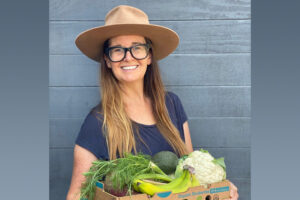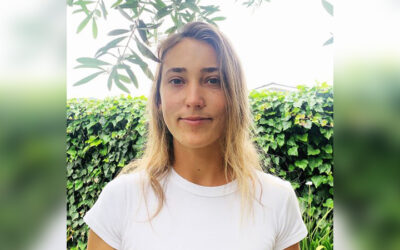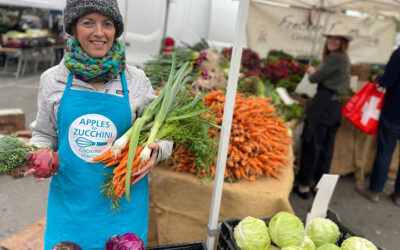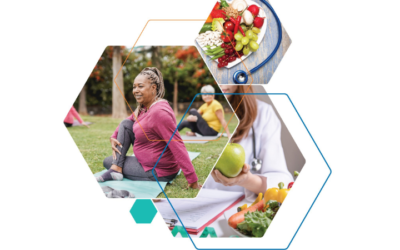A growing network of community members is powering Rooted Santa Barbara – let’s meet the team! Each month we’re highlighting a new member of our Rooted community to introduce who they are, why they are passionate about plant-based nutrition, and how they’re helping us to fuel our work to optimize our communities’ health through the power of plants.
 Emma Malina is the Steering Committee Vice Chair, lead plant-based educator, and a co-founder of Rooted. She’s been working to develop our mission and vision from the earliest days of development. Emma is also a local plant-based nutrition educator and food-skills instructor who empowers individuals and families worldwide to optimize their health and prevent chronic disease through nutrition education, cooking classes, coaching, and online resources through her business Basking in Goodness. You can find in-depth articles authored by Emma on The Heartbeet Blog and see her sharing plant-based nutrition information with organizations like FoodBank Santa Barbara County, the Breast Cancer Resource Center and The Physicians Committee for Responsible Medicine.
Emma Malina is the Steering Committee Vice Chair, lead plant-based educator, and a co-founder of Rooted. She’s been working to develop our mission and vision from the earliest days of development. Emma is also a local plant-based nutrition educator and food-skills instructor who empowers individuals and families worldwide to optimize their health and prevent chronic disease through nutrition education, cooking classes, coaching, and online resources through her business Basking in Goodness. You can find in-depth articles authored by Emma on The Heartbeet Blog and see her sharing plant-based nutrition information with organizations like FoodBank Santa Barbara County, the Breast Cancer Resource Center and The Physicians Committee for Responsible Medicine.
What inspired your passion for plant-based nutrition?
I grew up vegetarian, but as I got older and had my own family I started to notice changes in my personal health – I realized that simply being vegetarian was only scratching the surface. After a personal running injury that rendered me homebound for a number of months, I set out on a personal journey of recovery, self-discovery, further education, and edible experimentation. I devoured books, courses, podcasts, recipes, and documentaries – and the more I learned, the more my personal beliefs and values changed and solidified.
My passion for plant-based nutrition is at the level it is because I love food, I love my life, and I love my family – and anything I can do to eat more incredible meals while having endless conversations with them, for as long as humanly possible, means everything to me!
Is your passion purely personal or also related to your profession?
It started as a very personal journey but when we follow our passions and “do the work” we often unearth our greatest jobs! In dealing with my own struggles and my own physical & emotional setbacks, I’m now able to empower individuals and families to optimize their health and prevent chronic illness as a health coach, food skills instructor, wellness consultant, and plant-based nutrition educator.
What are some of the most compelling aspects of plant-based eating for you?
I think the most compelling aspect of whole food plant-based eating is that, in my opinion, it’s the closest thing that we have to a “magic pill” for hundreds, if not thousands, of chronic health issues. I have spent years pouring over scientific studies and research papers and studied with some of the leading doctors in the field and to see firsthand the impact of simply changing what you eat can have, is astounding. Through my studies I have learned stories and met people who have rebounded from diagnoses once deemed a death sentence. If simply changing your diet has the potential to prevent or possibly even reverse heart disease or obliterate type-2 diabetes, or even stop some cancers in their tracks, shouldn’t it be the number one thing that ALL doctors recommend their patients adopt? I often feel like I know the greatest secret on earth and yet very few people want to know it. I know people who have ended years of suffering from eczema, rheumatoid arthritis, lupus, and countless other illnesses by switching to a plant-based lifestyle and yet, we still cast it aside in preference of pills for life and extreme and invasive surgeries, all of course with side effects. Of course, nothing is a guaranteed cure-all but it is one of the easiest, least expensive and most non-invasive approaches to longterm, sustainable health that we have access to and once you get past the initial trepidation of cooking/eating in a new way, it’s incredibly delicious and the absolute antithesis of restrictive!
What advice would you give someone looking to be more plant-forward?
Try it for 30 days. Too long? Try it for a week. Too hard? Try it for dinner! The point being, just try it! Don’t overthink it, and don’t start by shopping for weird, special ingredients that have “plant-based” on the label. Just go for it. Keep it simple. Start where you are and work with what you have. Of course fresh and locally grown produce is ideal but there’s no shame in frozen or canned goods.
Focus on what you’re adding in and less about what you’re removing. When making any meal, ask yourself what more goodness could I add to this dish?
Chances are when you look at what you eat, you’re already eating a lot of plants so just making a few swaps or extra additions is really the key. Stick with whole foods and start playing around with flavors and easy, home-made sauces. The possibilities of literally endless!
What do you wish more people knew about a plant-based diet?
How delicious it truly is. I think we get caught up in this notion that healthy food tastes bad. “It tastes healthy” is typically not a complement! I do think it helps if you enjoy cooking, or at least like the idea of enjoying cooking. With over 20,000 edible plants on earth, going plant-based exposed me to foods and flavors I never would have dreamed of.
I’m often asked “What DO you eat?” And the funny thing is, I eat far more variety of foods now than I ever did as an omnivore! When in doubt, eat more plants!!
For a full list of our Rooted team, please visit our Collaborators page!
Team Member Spotlight: Layne Hayward
A growing network of community members is powering Rooted Santa Barbara - let’s meet the team! Each month we’re...
Partner Highlight: Apples To Zucchini Cooking School
A lot of the work we do at Rooted is built around meaningful partnerships with other Santa Barbara County community...
Rooted Santa Barbara County Partners With The American College Of Lifestyle Medicine To Invest In County Healthcare Workforce
Rooted Santa Barbara County and the American College of Lifestyle Medicine (ACLM) have launched a groundbreaking local...
Supporting Our Work - We’re currently an all-volunteer organization and we see incredible room and need to grow over the coming year. We understand that this time has enormous challenges for everyone, so while we’ll be seeking support to help roll our vision forward, we’re also thinking creatively to keep our costs low to efficiently build resources and deliver programming at low to no cost to our community. If you’d like to support our work, we hope you’ll consider making a donation to one of our giving programs through our community partner, the Santa Barbara Foundation!



